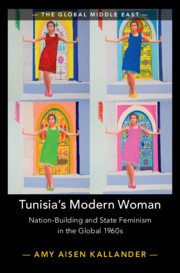Book contents
- Tunisia’s Modern Woman
- The Global Middle East
- Tunisia’s Modern Woman
- Copyright page
- Contents
- Figures
- Acknowledgments
- Note on the Text
- Introduction
- 1 Between State Feminism and Global Sisterhood
- 2 Family Planning as Development
- 3 Postcolonial Tunisian Academics
- 4 Fashion, Consumption, and Modern Gender Roles
- 5 Love and Sex
- Conclusion
- Bibliography
- Index
Conclusion
Love, Politics, and Bread
Published online by Cambridge University Press: 20 May 2021
- Tunisia’s Modern Woman
- The Global Middle East
- Tunisia’s Modern Woman
- Copyright page
- Contents
- Figures
- Acknowledgments
- Note on the Text
- Introduction
- 1 Between State Feminism and Global Sisterhood
- 2 Family Planning as Development
- 3 Postcolonial Tunisian Academics
- 4 Fashion, Consumption, and Modern Gender Roles
- 5 Love and Sex
- Conclusion
- Bibliography
- Index
Summary
This section considers the record of women’s political, economic, and social engagement in postcolonial Tunisia and its legacies beyond the 1960s. Despite continued restrictions on associational life, political repression, and a harrowing intellectual climate, women were involved in reformist projects into the 1970s and 1980s, and under the regime of Zine Al-Abidin Ben Ali as women’s rights were again instrumentalized as a cover for authoritarianism. Whether in political parties, human rights organizations, student groups, religious movements, or women’s journals, activists insisted on the relevance of gender to visions of social, economic, and political change. Sophie Ferchiou’s work on women in agriculture illustrates the limits of liberal models of women and development implemented in Tunisia in the 1970s and 1980s, and the structural causes of rural protests, such as those of 2010. Working within the establishment, nationalist women raised questions about the intersections of class, gender, and the urban-rural divide, even if their visions of emancipation fell short of challenging patriarchy. However, in their activism and publications they demonstrated a plurality of women’s experiences that could not be captured in the singularity of state discourse on the modern woman.
- Type
- Chapter
- Information
- Tunisia's Modern WomanNation-Building and State Feminism in the Global 1960s, pp. 239 - 253Publisher: Cambridge University PressPrint publication year: 2021

